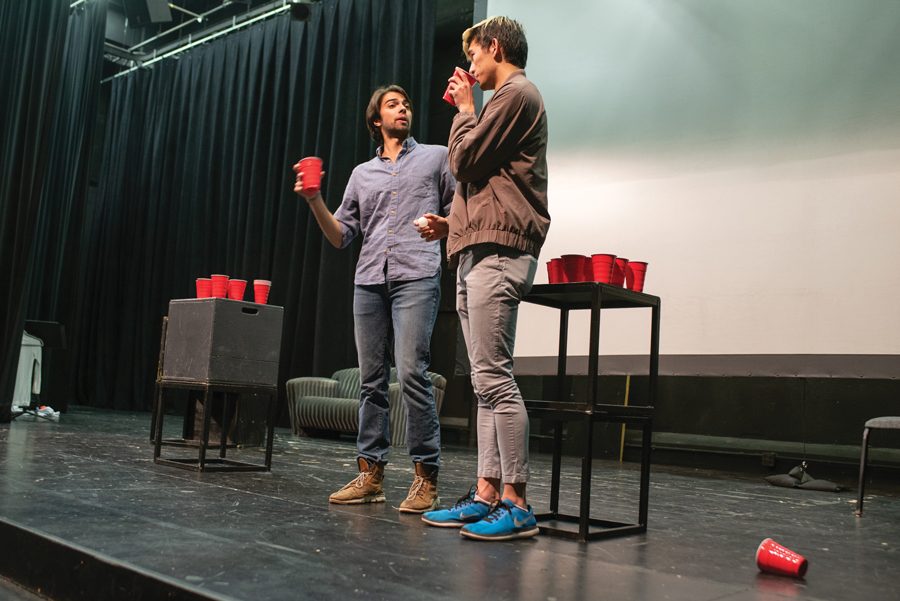Overlooked: Students in theatre emphasize need for minority representation
Daily file photo by Evan Robinson-Johnson
Project NU cast members rehearse for their show. Head writer Janet Lee said it was focused on Asian and Asian American experiences in college.
May 27, 2019
Spectrum Theatre Company’s annual production, Project NU, is a student-run theatrical work that focuses on bringing the voices of the Northwestern community to the stage, oftentimes centering around certain underrepresented groups on campus. This spring’s production, “Blessings in Disguise,” which ran in May, was no different.
The show focused on the experiences of Asian and Asian-American students navigating college life and the intersection of their identities and mental health, which director Allison Zanolli said was an exciting premise. Zanolli said she had never seen a completely Asian-American cast in any campus production before, and while the Communication junior said she thought directing the show would be “a challenge,” she was willing to take it on.
However, Zanolli, who was selected following an extensive, multi-step process in which she petitioned to be the production’s director to the student board of Spectrum, is white.
She said the fact that she was directing a production that revolved around the lives of Asians and Asian Americans — a group she does not identify with — was something she had to be constantly aware of.
Asians and Asian Americans’ portrayal in the entertainment industry has often been tokenizing, or relied on stereotypes that are both offensive and inaccurate. But this issue is not limited to a certain demographic of people — tokenization and stereotyping have played into depictions of people of color throughout the entertainment industry.
Communication first-year Mariana Reyes, who is currently workshopping an original play that will feature an all-Latinx cast, said she wants to change that. She said she has noticed that while performance groups on campus try to be inclusive, it’s really the production team’s choices and biases that affect the way casting and minorities are represented.
“A lot of the time when there are casting notices sent out, the directors and the producers have an idea of an ethnicity they want in their head and will choose someone depending on that,” Reyes said. “They just put the label ‘open ethnicity’ in order to not be attacked by students or by other people on campus.”
Janet Lee, who is this year’s Project NU head writer and also a Spectrum board member, said when problems regarding representation of minorities arise on campus, the theater community tends to leave them “unresolved.”
For instance, in early 2017, Arts Alliance, a student-run arts group at Northwestern, came under fire for being “racially irresponsible” during the casting of its fall mainstage show, “The 25th Annual Putnam County Spelling Bee,” according to an open letter written by two Communication students.
One of the play’s main characters is traditionally played by an East Asian actor, but none of the actors who received a callback were Asian or Asian American, prompting backlash from students. Lee said even though the University and student organizations promise improvements when issues like this arise, the responsibility largely and unfairly falls on people of color, when it should be a priority for the entirety of student theater.
“We try to assume best intentions, but sometimes, people may be unaware of their
microaggressions that may be hurting other people in a way that they may not have necessarily intended to do so,” the Medill junior said. “That places a lot of burden on the people of color or the person calling out to correct and speak to that experience.”
Despite this, problems still emerge when the production crew or playwrights are being deliberately careful with casting. In her introductory playwriting class, Reyes was tasked with writing a 30-page full-length play. She chose to write about underrepresented communities — specifically gay men — in Colombia, her home country.
Reyes said she plans on sending her play to different student theater coalition groups, and hopes that one of them will put it on stage. However, if her play gets approved, she said she expects she’ll run into problems with casting.
Reyes is worried she’ll be limited by the need for her play to have cast members be fluent in Spanish — her script has Spanish words in it and she wants people to think her play is situated in Colombia, not the United States.
“You want to be able to do colorblind casting, where you’re like, ‘Oh I’m just going to choose the person that’s best because of their talent,’” Reyes said. “It would definitely prove a challenge because I want to be able to both have the best actors that are also Latino, and I have to conform to one or the other.”
Project NU did not end up running into this problem; its entire cast was Asian American. However, Zanolli said she knew it was her responsibility as the director to have a deep understanding of the story and make the characters as “rich and real” as possible — especially because there were certain experiences that she couldn’t identify with.
“It was like a challenge that I was willing and excited to take on because if you’re unwilling as a director to take on roles that you don’t completely identify with or that don’t match your personal experiences, you’re only going to end up making art that looks like you,” Zanolli said. “That, to me, is kind of boring.”
Lee said she knew Zanolli couldn’t identify with certain aspects of the production’s narrative. However, they were still able to work well together, something she attributes to Zanolli’s view of her role as director. Zanolli was “present” throughout the entire process, Lee said.
“That collaboration of not coming in directly being ‘Oh, this is a story I can tell,’ but constantly working towards understanding different narratives and being very respectful of that is what made it work,” Lee said.
Email: [email protected]
Twitter: @neyachalam












